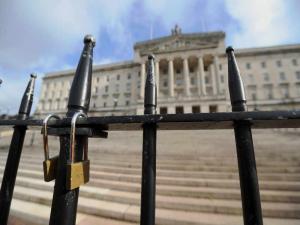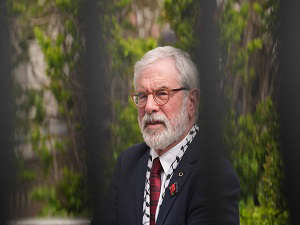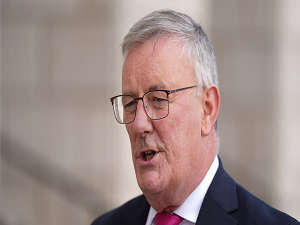
By David Young
The Government has moved to again delay the legal requirement to call an Assembly election in Northern Ireland.
Northern Ireland Secretary Karen Bradley is seeking to push back the end of August deadline amid the ongoing impasse between the region's rowing parties.
The latest talks process, which was established in the wake of the dissident republican murder of journalist Lyra McKee in Londonderry in April, appears to have lost momentum, with negotiations showing no sign of delivering a breakthrough to re-establish devolution.
The process involving the UK and Irish governments and the five main Stormont parties is the latest in a series of as yet unsuccessful bids to resurrect institutions that crashed more than two and a half years ago.
With the politically sensitive summer marching season approaching its height, a time period not considering conducive for striking compromises, the prospects of consensus emerging in the coming weeks appear slim.
Over the last two months, there has been little evidence of any movement on key logjams preventing a return of Stormont, such as Irish language protections and the ban on same sex marriage.
Mrs Bradley is tabling legislation at Westminster to extend the deadline by which she will have a legal duty to call an election.
It is set to be debated in the Commons next week.
An onus to call an election had been on the Northern Ireland Secretary since the collapse of powersharing, but last year she move to temporarily remove the provision, to provide space for the parties to reach consensus.
She had already extended what was a March deadline to the end of August.
She is now seeking to move it further back, though it is still unclear what the new deadline will be.
It is understood a group of cross-party MPs are considering proposing an amendment to Mrs Bradley's Northern Ireland (Executive Formation and Exercise of Functions) Act 2018 that would compel the UK government to legislate for same sex marriage in the region.
That move could be frustrated however if the Government attempts to fast-track the bill through the Commons without amendments.
The last DUP/Sinn Fein-led powersharing coalition imploded in January 2017 when the late Martin McGuinness quit as Sinn Fein deputy first minister amid a row about a botched green energy scheme.
The fallout over the renewable heat incentive (RHI) was soon overtaken by disputes over the Irish language, same-sex marriage and the toxic legacy of the Troubles.
On Wednesday, Sinn Fein MLA Conor Murphy claimed the pace of talks has gone into "go-slow" mode ahead of the annual July 12 parades across Northern Ireland celebrated by unionists and loyalists.
But DUP MP Gavin Robinson hit back, accusing Sinn Fein of "making excuses" and of a "lack of engagement" in the talks.


 Gerry Adams awarded 100,000 euro in damages after suing BBC for libel
Gerry Adams awarded 100,000 euro in damages after suing BBC for libel
 Victim held in room while masked men ransack Saintfield home
Victim held in room while masked men ransack Saintfield home
 Nesbitt not surprised if ‘devastating’ culture in RVH report repeated elsewhere
Nesbitt not surprised if ‘devastating’ culture in RVH report repeated elsewhere
 Pensioner, 82, killed in crash near Omagh
Pensioner, 82, killed in crash near Omagh
 Kneecap announce new song ahead of headline performance at London’s Wide Awake
Kneecap announce new song ahead of headline performance at London’s Wide Awake